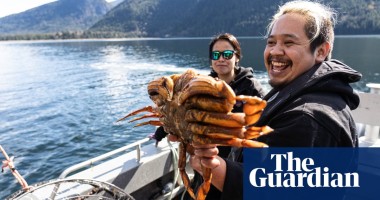‘It was like the wild west’: meet the First Nations guardians protecting Canada’s pristine shores ( www.theguardian.com )
It's Delaney Mack’s first time pulling crab traps and she is unsure what to do. Mack, the newest member of the Nuxalk Guardian Watchmen, has had months of training for the multifaceted job, which might on any given day include rescuing a kayaker, taking ocean samples or monitoring a logging operation. But winching crabs up 100ft from the sea floor was not in the manual.
Soon, however, the four-person operation is humming along. The crab survey is a vital part of their work as guardians of this Indigenous territory in the Canadian province of British Columbia. It was started more than 15 years ago in response to heavy commercial crab fishing in an area where the federal government had done little independent monitoring to determine if a fishery was sustainable.
It is the quintessential guardian assignment: remote monitoring work of immediate importance to a small community, far beyond the gaze of administrators at understaffed government agencies.
The watchmen are the eyes and ears of their First Nation community on the lands and water of their territory, which spans about 18,000 sq km (7,000 sq miles, roughly the size of Kuwait) on the central coast of British Columbia around the town of Bella Coola, 430 mountainous kilometres northwest of Vancouver.
